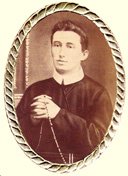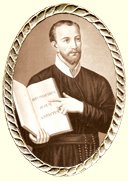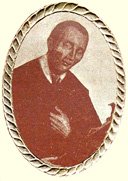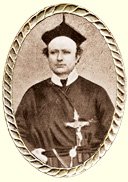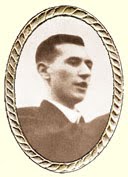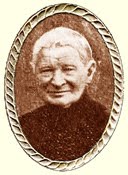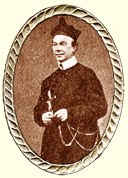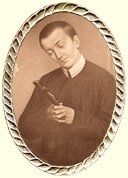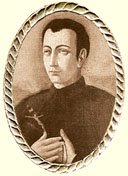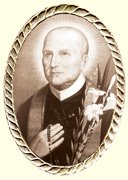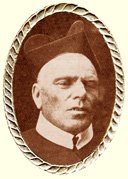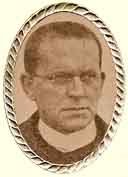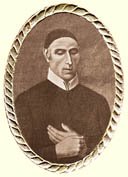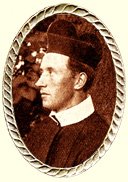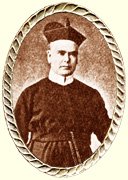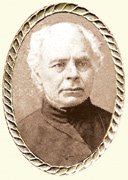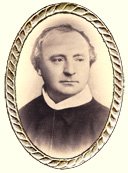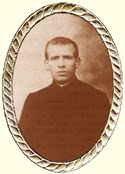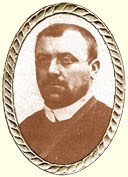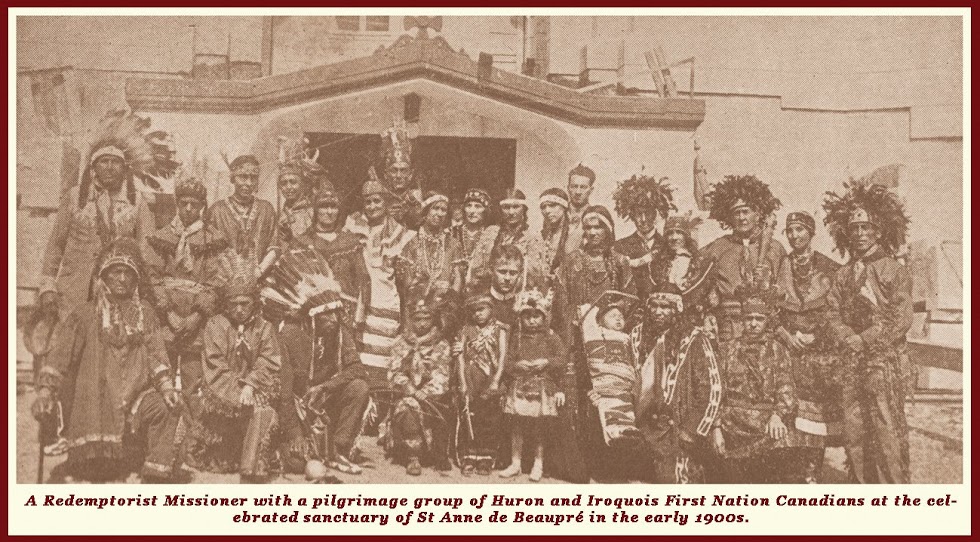The Servant of God Very Rev. Fr Friedrich Von Held, C.SS.R. (1799-1881)
Father is also often refered to as Frédéric de Held
In order to present a complete picture of his activity for the Congregation of the Most Holy Redeemer, and the virtues of this highly meritorious disciple of the St Clement Hofbauer, we would have to have rather extensive commentaries from four provinces – Austrian, Belgian, American and Lower German – because Fr. Von Held was assigned to each of these districts and occupied a prominent position in every one of them. Since primary sources are not at our disposal, we have to make do with delineating a biographical sketch of Father in scant outlines. Hopefully someone will soon write a detailed biography of this honourable pillar of the Congregation.

Friedrich Ritter Von Held (Ritter, German for "knight" is used as a title of nobility in German-speaking areas) was born on July 17, 1799, in Brunn am Gebirge in the vicinity of Vienna. Nature provided Friedrich with very good abilities. He possessed a clear intellect with a good amount of discretion and accurate, prudent judgement, and had a great talent for organizing – mental faculties which highly enabled him in his future influential offices and in the propagation of the Congregation. He had a magnanimous, earnest character which helped him in the great projects he would be given. His character was stamped into his strong, noble facial features (full of high rank and dignity), and in his complete outward appearance. And so, highly gifted by nature, perfected by grace, it was to be expected that he would be a qualified tool in the Hand of God in those great enterprises which the Lord wanted to accomplish through him.
However, the spirit of false “Enlightenment” which in his youth ruled amongst the distinguished families of Vienna was in fact impeding his religious education. About this, Fr. Held said in a written memorandum:“ In order to characterize the atmosphere in which I received my first impressions with regard to religious and moral education, it is sufficient to say that in the considerable library of my father the French Encyclopaedia and the French works beloved in those days . . . had the most prominent place”. Still, strict customs which in the Held family had survived from an unalloyed Christian era did nevertheless manage to keep all evil influences far from him in customary ways. The lack of Christian religious formation and education was soon rectified in a most favourable way through the special providence of God.
During Friedrich’s study of philosophy at the University of Vienna, he became acquainted with a “truly Catholic man of great talent - who after the completion of his legal studies experienced a true call to the priesthood”. His name was Springer and he was a pupil of the sainted Fr. Hofbauer. He subsequently entered the Congregation of the Most Holy Redeemer in Vienna. Through this excellent friend, Friedrich met Fr. Hofbauer, and thus he linked up with the group of struggling students which was accustomed to meet evenings at the house of that honorable servant of God, Fr Hofbauer. Friedrich chose Fr. Hofbauer as his Confessor and was under his spiritual guidance for almost three years until Fr. Hofbauer’s death. From this saint-like spiritual leader, Friedrich absorbed into his inner being the living faith, that true, Catholic, devout religious disposition that animated Fr. Hofbauer and which from that time on also became evident to a very high degree in Fr. Hofbauer’s docile pupil, Friedrich Von Held.
After finishing his philosophy studies, Held was expected to begin the study of jurisprudence, according to the wish of his father. But Friedrich felt himself called to the priesthood and a religious order. He decided therefore to the great surprise and dismay of his parents (as he himself expressed it) to study theology with the later intention of entering the Congregation of the Most Holy Redeemer which Fr Hofbauer was introducing into Austria. Friedrich carried out this resolution despite the referred to family difficulty. He was one of the first to enter the Novitiate opened after the death of the saintly Fr. Hofbauer.
Friedrich received the habit of the Order on May 19, 1820. Since Fr. Passerat had immediately accepted the complete responsibility of the Novitiate after his arrival in Vienna, Fr. Friedrich had the invaluable advantage to be initiated into asceticism and especially in the spirit of the Congregation by this saintly and highly inspired son of St. Alphonsus. If one can correctly say of Fr. Passerat that he instilled the Congregation north of the Alps with the spirit of asceticism , so Fr. Held was destined to transmit this spirit to the succeeding sons of the Congregation.
On Aug, 2, 1821, the first vows in the new Novitiate were professed. Fr. Held was one of the nine novices who were fortunate to be the first professed of the Congregation in Austria. After he was ordained a priest on Aug. 21, 1823, he began working in the Vineyard of the Lord at once. He was one of the first missionaries in Styria. The chronicle of Frohnleiten in Styria calls him a man of glowing zeal, who to judge by his appearance, was like a penitential hermit, who on the pulpit was like a strong lion who sets hearts trembling, but was in the confessional a gentle lamb. He encouraged and healed sinners as if he were their medical doctor as well as father.
On Oct. 30, 1826, he was named Prefect of Students in Vienna. But soon received another appointment. On Feb. 8, 1827, along with several confreres, he was sent to Styria to establish the Collegium in Mautern. The Collegium was to be designated as a house for our young clerics. Here he filled the post of Lector in Moral Theology for three years.
In May of 1830 he was named the advisor to the Vicar General, the Reverend Fr. Passerat, and therefore lived from July 19, 1830, in Vienna again. From this time until 1854 Fr. Held participated in all matters of the Congregation north of the Alps as well as most of the branches of the same. In 1832 he travelled to Naples as Vocal of the Viennese Collegium. There he took part in the General Chapter which was summoned for the selection of a Superior General.
However, the spirit of false “Enlightenment” which in his youth ruled amongst the distinguished families of Vienna was in fact impeding his religious education. About this, Fr. Held said in a written memorandum:“ In order to characterize the atmosphere in which I received my first impressions with regard to religious and moral education, it is sufficient to say that in the considerable library of my father the French Encyclopaedia and the French works beloved in those days . . . had the most prominent place”. Still, strict customs which in the Held family had survived from an unalloyed Christian era did nevertheless manage to keep all evil influences far from him in customary ways. The lack of Christian religious formation and education was soon rectified in a most favourable way through the special providence of God.
During Friedrich’s study of philosophy at the University of Vienna, he became acquainted with a “truly Catholic man of great talent - who after the completion of his legal studies experienced a true call to the priesthood”. His name was Springer and he was a pupil of the sainted Fr. Hofbauer. He subsequently entered the Congregation of the Most Holy Redeemer in Vienna. Through this excellent friend, Friedrich met Fr. Hofbauer, and thus he linked up with the group of struggling students which was accustomed to meet evenings at the house of that honorable servant of God, Fr Hofbauer. Friedrich chose Fr. Hofbauer as his Confessor and was under his spiritual guidance for almost three years until Fr. Hofbauer’s death. From this saint-like spiritual leader, Friedrich absorbed into his inner being the living faith, that true, Catholic, devout religious disposition that animated Fr. Hofbauer and which from that time on also became evident to a very high degree in Fr. Hofbauer’s docile pupil, Friedrich Von Held.
After finishing his philosophy studies, Held was expected to begin the study of jurisprudence, according to the wish of his father. But Friedrich felt himself called to the priesthood and a religious order. He decided therefore to the great surprise and dismay of his parents (as he himself expressed it) to study theology with the later intention of entering the Congregation of the Most Holy Redeemer which Fr Hofbauer was introducing into Austria. Friedrich carried out this resolution despite the referred to family difficulty. He was one of the first to enter the Novitiate opened after the death of the saintly Fr. Hofbauer.
Friedrich received the habit of the Order on May 19, 1820. Since Fr. Passerat had immediately accepted the complete responsibility of the Novitiate after his arrival in Vienna, Fr. Friedrich had the invaluable advantage to be initiated into asceticism and especially in the spirit of the Congregation by this saintly and highly inspired son of St. Alphonsus. If one can correctly say of Fr. Passerat that he instilled the Congregation north of the Alps with the spirit of asceticism , so Fr. Held was destined to transmit this spirit to the succeeding sons of the Congregation.
On Aug, 2, 1821, the first vows in the new Novitiate were professed. Fr. Held was one of the nine novices who were fortunate to be the first professed of the Congregation in Austria. After he was ordained a priest on Aug. 21, 1823, he began working in the Vineyard of the Lord at once. He was one of the first missionaries in Styria. The chronicle of Frohnleiten in Styria calls him a man of glowing zeal, who to judge by his appearance, was like a penitential hermit, who on the pulpit was like a strong lion who sets hearts trembling, but was in the confessional a gentle lamb. He encouraged and healed sinners as if he were their medical doctor as well as father.
On Oct. 30, 1826, he was named Prefect of Students in Vienna. But soon received another appointment. On Feb. 8, 1827, along with several confreres, he was sent to Styria to establish the Collegium in Mautern. The Collegium was to be designated as a house for our young clerics. Here he filled the post of Lector in Moral Theology for three years.
In May of 1830 he was named the advisor to the Vicar General, the Reverend Fr. Passerat, and therefore lived from July 19, 1830, in Vienna again. From this time until 1854 Fr. Held participated in all matters of the Congregation north of the Alps as well as most of the branches of the same. In 1832 he travelled to Naples as Vocal of the Viennese Collegium. There he took part in the General Chapter which was summoned for the selection of a Superior General.

First and foremost at this time the establishment of our houses in Belgium took place. Earlier on, two Fathers from our house in Freiburg had settled in Tournai for this purpose. Fr Held was sent to Belgium on Feb. 13, 1833, in order to take charge of the foundation and direction of the new houses. The outstanding Bishop of Liege, Cornelius van Bommel, became very fond of Fr. Held, and supported all of his endeavours. Fr. Held founded (1833-1836) the three establishments of the order in Liege, St. Trond, and Wittem. In this manner the Congregation took root in Belgium and began to grow quickly there.
In 1839, Fr. Held was present at the canonization in Rome of our saintly founder. At the subsequent naming of the new Superior, Fr. Held was designated Rector of the House in Liege. After that, by the decree of the Holy See (July 2, 1841), the Congregation was divided into provinces. Fr. Held was named Provincial of the Belgian Province of the Congregation. The houses in North America were also placed under his leadership for the time being. In order to make sure of the condition and needs of the American houses, Fr. Held journeyed in 1845 to the United States. Under his Provincialate in America the Congregation experienced such an upward swing that it became necessary in 1850 to set up a Province of its own.
The first mission of Belgian Redemptorists to England took place during Fr. Held’s Administration. After he had fulfilled the office of a Provincial for six years he entrusted it to other hands and was named Visitation officer (Visitator) to the English Hospices. As such he made his way to England in 1848. There he became specially noted by the foundation of the house in Clapham (near London).
Named Rector of Wittem in 1854, he witnessed the General Chapter in Rome (1855).As Vocal of the Belgian Province, he took a distinguished part in the Chapter. In the election of a new Vicar General of the Congregation, half of the votes went for Fr Held, while the rest went to another priest. Until even distribution of the votes, when both parties united in the election of Fr. Mauron.
After the General Chapter Fr. Held functioned once again for three years as Rector of the house in Liege. Then spent in that place three years as a simple member of the Order. In this way he proved that he understood how to obey as a subordinate just as well as how to administrate as a superior. Then, also as a simple subordinate, he moved back to Aachen to the newly created Lower German Province. Here he joined very conscientiously in all the exercises of the Congregation, despite his advanced age. He observed the Rule exactly, and worked in the Confessional as long as his strength permitted.
On Aug. 2, 1871, along with the most joyful participation of his confreres in the Congregation, he celebrated the Fiftieth Jubilee of his profession of Vows. It was a celebration of great joy and inner thanks to God for Fr. Held as well as for all the Redemptorists present. How quickly in the last fifty years had the Congregation spread, not only in the Old World but also in the New World on that other side of the Ocean! How flourishing, vigorous, and respected was the position of the Congregation now! During these long years in influential offices which had been entrusted to him the Jubilarian had contributed so much to the spread and strengthening of the Order.
A few weeks before the jubilee of his ordination, Fr. Held had to emigrate like an exile as a result of the outburst of assaults on monasteries in the new German Empire. He travelled to England again, where he stayed one year in the house at Clapham which he had founded. Called to return by the Provincial of the Lower German Province, he journeyed (Sept 1874) to his German confreres in Vaals, where their dear Patriarch was received with great joy and where they took care of him with respectful love until his blissful end.
The words of His Excellency Bishop Laurent on the memorial leaflet of Fr. Held reflect the end of his life and are applicable here: “after he filled all the offices of his Order for twenty-six years, he was still strong at 60 years and remained on for another twenty-two years. The Congregation had benefited by four Provinces, which he had so strongly sponsored. Like the Prince of the Apostles Peter he had ‘girded himself and went wherever he wanted when he was young; but as he became old he stretched out his arms and allowed himself to be girded and led by others in the direction he had not chosen' (John 21, 18). Was that proof of dissatisfaction of the Lord with his servant? No, it was rather recognition and reward for Fr. Held’s works. It was the son’s share of the lot of his fathers: the sainted Fr. Alphonsus, the venerable Fr. Hofbauer, the saint-like Fr. Passerat, all of whom were prepared in their last years for a long retirement more by a higher providence than by their own choice,‘the youth can become content if he becomes like his master’. (Matt 10, 25).
"As Fr. Von Held distinguished himself by his work in the vineyard of the Lord, by his administration of his Order, by his achievements in Holy Church, so he edified all who knew him by his seclusion, by his subordination, by his silence. Even then, he was not non-productive. He employed his retirement in Aachen and Vaals in thankful memory of all that God had done for him and through him, in atonement for any and all unavoidable human additions to God’s work, in the preparation for giving an account of his stewardship to God.
"He used his retirement to gain the highest merit of total self-denial, serious mortification, complete withdrawal from everything that was not of God. During his retirement he always continued to exemplify by his conduct all of the priestly and monastic virtues, in continual sacrifice and prayer for the severely persecuted and oppressed church and for his fervently beloved Order, in devoted communion with his confreres and in most willing obedience to his superiors, and in peaceful practice of pastoral care in the Confessional and in his sickbed, as long as he could.
"God did not allow the trial of the cross to fail to be present for this true servant of His, this priest who had so conscientiously and fruitfully managed his given talents for the honor of the Lord. Trials were allotted to him abundantly. His soul suffered on account of the great new persecution in the Church in Germany which devastated so many flourishing houses of his community and drove him along with hundreds of his conferees into exile. He also endured bodily infirmities during his last four years by way of a gradual and finally complete blindness which made saying Mass impossible for him.
"Fr. Held passed these tests with heroic, noble courage, suffering with his crucified Redeemer. With the faith of a child, he resigned himself to the adorable Will of God. And so his eventful life ended in a gentle sunset”. – thus far his Excellency Bishop Laurent.
As a result of the complete exhaustion of his physical powers and the accompanying senility, Fr. Held became in body as needy as a small child. Also in spiritual respects he became not unlike a child. He was not able to retain anything in his memory, but still his whole demeanor always remained one of a noble, worthy priest and religious. In the same way he always maintained the receptiveness for spiritual things, his love for regular observance and prayer until his death.
He was confined to his sickbed from Jan. 25, 1881. He longed for death and to be with Christ. For that reason he began a novena to the Venerable Fr. Hofbauer, his spiritual leader and father, so that he would be called away to the better life through Fr. Hofbauer’s intercession. He was heard. The novena was not quite ended when he experienced strong convulsions in the afternoon of April 19. These strong, impacting convulsions crushed his last vitality. His death was expected that same night. However, his strong nature still withstood the power of death. He lived the whole of the next day, while the powerful convulsions kept repeating themselves. His energy became completely consumed during this hard fight and he expired very gently in the Lord on the night of April 20 at 11.30 p.m. His last hour was of peaceful breathing and then he fell asleep in the arms of Mary (whom he honored and loved all the days of his life) and on the Heart of Jesus for Whom he lived and for Whom he died.
After his death his countenance took on his normal peaceful, noble expression again. The faithful who looked on him in his bier were amazed. On the fourth day after his death his arms were still flexible and capable of being brought up to his chest in a cross formation without difficulty. The deceased had desired earlier to have this done. No sign or odor of decay could be noticed. His body was buried in the monastic cemetery in Vaals on April 24 to await there the glorious resurrection. †
(Translated by Mrs Marianne Lang from the German of Rev. Fr A. Krebs, C.SS.R., Kurze Lebensbilder der verstorbenen Redemptoristen der Ordensprovinz von Nieder-Deutchland, 1896.)





















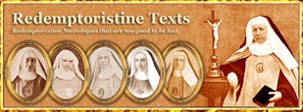
.jpg)









